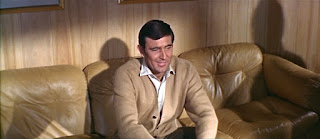Annus Horribilis
Welcome to the Blogging By Cinemalight Annual Report for 2024.
I know for you investors out there, you'll want us to get to the bottom-line first, so here we go.
No.
We did not make a profit this year. As a result, there will be no stock
dividends. This will come as a disappointment to no one...as no one is
an investor.
On
the other hand, we didn't have any losses, so we do not foresee any
lay-offs. As I'm the only employee, this comes as a big relief. And a
bit of a disappointment, as my hands are getting a little "crampy".
There were no great events last year to mention and no goals reached, no new milestone to crow over. I did complete the Blogging By Cinemalight Index and have been updating it regularly. Sometimes the site's "Search" feature doesn't immediately give me the results I want and the Index is a rundown of everything here. If it makes searching or skimming that much easier, it's worth doing. So far, there have been 38,800 visits so that's made all the time I spent putting it together worth it 38,800 times.
It should be noted that, although no milestone was reached, there was significant activity. Consider—it took 10 years to reach 1 million viewers. We now stand—at the moment of writing—at 1,736,832 total views. We ended last year at 1,335,253, so that means (calculator noises) there were 401,579 views in 2024. That's almost half a million. In one year. That's pretty big...especially considering how long it took to get to the Big 1M. Unless I become a pariah in the near-future, we should hit the 2 million mark next year. "Onward and Upward," indeed.
So...what the hell have YOU been looking at this year? No doubt, this is of no importance to anyone but myself. But, I always find it interesting, and what's popular usually has no relation at all to what I consider things worthy of attention or had any particularly good writing or insights.
Gran Torino 122
The only new review that made it into the list was the look at Deadpool & Wolverine, which (I suppose) one can understand. There were no campaigns from Singapore trying to artificially push a post into the top spot (an action that I've never been able to fathom and probably never will—who knows why people do things?). But, it's nice to see a spread like this, especially for some things and subjects I'm quite fond of. It will be interesting to see if it's this random at the end of 2025.
Next, here is what has been getting the most looks since the thing started almost 11 years ago. The only change from last year is that Wonder Woman 1984 and The Naked City swapped positions.
Honorable mentions:
Honorable mentions:
Doctor Sleep 1.44k
Finally, here are some of my favorite thing to look at on YouTube—trailer mash-ups.
I should caution that due to one particularly used quote from Deadpool & Wolverine that these are NSFW:
And, finally, here's the "TCM Remembers" segment for 2024. Whenever some group, however well-intentioned, does one of their "In Memoriam" segments, they always leave people out, or there's something lacking. Not TCM. They're always well-thought out and when they provide clips they're of the people at their best. And that's the way to remember them.














































































































